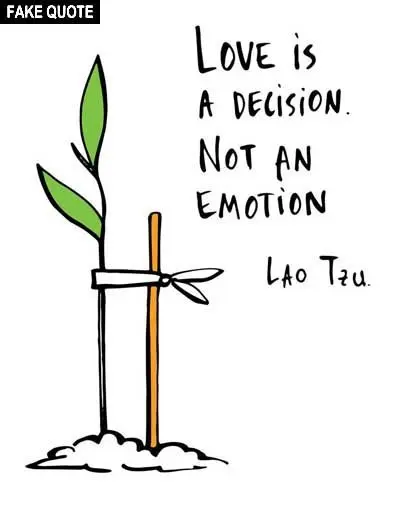Fake Lao Tzu Quote
"Love is a decision..."

This is NOT a quote from Tao Te Ching:
"Love is a decision — not an emotion."
The Book
The Taoism of Lao Tzu Explained. The great Taoist philosophy classic by Lao Tzu translated, and each of the 81 chapters extensively commented. Click the image to see the book at Amazon (paid link).
More about the book here.
|
Lao Tzu did not discuss love much, and nothing about the amorous love between two persons suggested by this quote. In my version of Tao Te Ching, the word "love" is used only twice, and none of them is about love in the conventional sense. In chapter 13 it refers to caring for the world as much as for oneself:
He who loves his body as much as the world
Can be entrusted with the world.
|
90 of the most spread false Lao Tzu quotes, why they are false and where they are really from. Book by Stefan Stenudd. Click the image to see the book at Amazon (paid link).
More about the book here.
|
In chapter 17 it is about the people's feelings towards their ruler:
The supreme rulers are hardly known by their subjects.
The lesser are loved and praised.
The even lesser are feared.
The least are despised.
The idea to regard love as a decision more than an emotion is from the psychoanalyst and sociologist Erich Fromm (1900-1980) in his book The Art of Loving from 1956. He wrote about a love that is committed and intended to last (page 56):
To love somebody is not just a strong feeling — it is a decision, it is a judgment, it is a promise. If love were only a feeling, there would be no basis for the promise to love each other forever. A feeling comes and it may go. How can I judge that it will stay forever, when my act does not involve judgment and decision?
In later literature it has been shortened to the quote discussed here. The earliest example of this I have found is in The Healing Energies of Music from 1983, by Hal Lingerman. He paraphrased Fromm, naming The Art of Loving as his source. Later books with this quote mention neither Fromm nor anyone else as the source.
Also on the Internet the quote started to appear years ago, without any accreditation. Around the year 2013 the reference to Lao Tzu started to appear, mainly in memes. In July that year, the quote got its first like on Goodreads, where it was also accredited to Lao Tzu.
My guess is that the accreditation to Lao Tzu happened rather haphazardly. The quote was around years before, and somewhere along the way it was starting to get linked to Lao Tzu, just to set a fancy name to it.
Stefan Stenudd
September 17, 2020.
There are many more fake Lao Tzu quotes examined on this website.
Click the header to see a list of them.
Click the header to read a "fake" interview with Stefan Stenudd, the author of
Fake Lao Tzu Quotes.
My Taoism Books
Click the image to see the book at Amazon (paid link).
The Taoism of Lao Tzu Explained. The great Taoist philosophy classic by Lao Tzu translated, and each of the 81 chapters extensively commented.
More about the book here.
The Ancient Wisdom of the Tao Te Ching by Lao Tzu. 389 quotes from the foremost Taoist classic, divided into 51 prominent topics. Click the image to see the book at Amazon (paid link).
More about the book here.
Erroneous Tao Te Ching Citations Examined. 90 of the most spread false Lao Tzu quotes, why they are false and where they are really from. Click the image to see the book at Amazon (paid link).
More about the book here.
|
My Other Websites:
The 64 hexagrams of the Chinese classic
I Ching and what they mean in divination. Try it online for free.
The ancient Chinese life energy
qi (
chi) explained, with simple instructions on how to exercise it.
The many ancient and modern life force beliefs all over the world explained and compared.
Other Books by Stefan Stenudd
Click the image to see the book at Amazon (paid link).
The Greek philosophers and what they thought about cosmology, myth, and the gods.
The life energy
qi (also
chi or
ki) explained, with exercises on how to awaken, increase and use it.
Basic concepts of the peaceful martial art. Aikido principles, philosophy, and fundamental ideas.
Qi, prana, spirit, ruach, pneuma, and many other life forces around the world explained and compared.
Jungian theories on myth and religion examined, from Carl G. Jung to Jordan B. Peterson.
About me
I'm a Swedish author and aikido instructor. In addition to fiction, I've written books about Taoism and other East Asian traditions. I'm also an historian of ideas, researching ancient thought and mythology. Click the image to get to my personal website.

 Tao Te Ching
Tao Te Ching Now it's a book, too!
Now it's a book, too! Tao Quotes
Tao Quotes Cosmos of the Ancients
Cosmos of the Ancients Qi — Increase Your Life Energy
Qi — Increase Your Life Energy Aikido Principles
Aikido Principles Life Energy Encyclopedia
Life Energy Encyclopedia Archetypes of Mythology
Archetypes of Mythology Stefan Stenudd
Stefan Stenudd